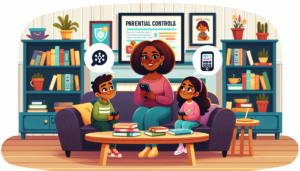| Takeaways | Description |
|---|---|
| School Rules Respect | Adherence to individual classroom rules regarding smartphones. |
| Cheating Prevention | Encouraging honest learning over internet-assisted shortcuts. |
| Cyberbullying Zero Tolerance | Understanding and prevention of cyberbullying during and after school. |
| Silent Mode Courtesy | Keeping phones silent to respect the learning environment and encourage real interactions. |
| Educational Use | Smartphones as educational tools, not entertainment devices during school hours. |
| Teacher Communication | Open dialogue with teachers about students’ smartphone etiquette. |
| Post-School Balance | Ensuring a healthy balance of screen time with other activities after school. |
| Homework First | Establishing a ‘homework before screen time’ rule. |
| Screen Time Limitation | Using Safe Lagoon to schedule and limit screen time effectively. |
| Mealtime Engagement | Keeping phones away during family meals to foster communication. |
| Bedtime Restrictions | Preventing late-night phone use to avoid sleep disruption and risky behaviors. |
Hey there, parents and guardians! Let’s dive into the digital backpack of today’s youth. Remember the good ol’ days of hand-written notes? Well, they’re as ancient as the dinosaurs now. Today’s norm? Texting under the desk with the stealth of a ninja.
During School Hours
Gone are the days of draconian phone bans. Schools are loosening up, but that doesn’t mean it’s free rein for students. Here’s the lowdown on teaching your child smartphone manners at school:
- Respect the Rules: Every classroom’s got its own vibe. Encourage your kids to vibe with it. Whether it’s using their phone as a calculator or stashing it during algebra, remind them to play by the rules.
- Don’t Cheat: Hey, Google’s smart, but it’s not the teacher. Make sure your kids get this: Learning the hard way beats a quick search any day.
- No Bullying: Kids can be mean, but cyberbullying’s a whole new beast. Make it crystal clear: It’s a big no-no, anytime, anyplace.
- Silence is Golden: Phones should be seen, not heard. Silent mode’s the secret sauce to keeping everyone sane and focused.
- Educational, Not Recreational: Got the green light to use phones for learning? Awesome. But remind your kids, it’s a privilege, not a ticket to Candy Crush saga during math.
After the Bell Rings
When the school bell chimes, freedom! But hold up, it’s not all fun and games. Here’s how to keep those smartphones from hijacking your kid’s after-school life:
- Homework First: School’s out, but the brain’s still in. Phones take a backseat until the homework’s done. Consider it their ticket to digital downtime.
- Outdoor Adventures: There’s a whole world beyond the screen. Nudge your kids outside or get them into a board game battle. Mix it up!
- Mealtime = No Phone Zone: Family dinners aren’t just about the food. They’re about sharing stories and laughs. So, phones down, forks up.
- Bedtime Peace: Keep those phones out of the bedroom. Late-night scrolling? Not on our watch. Sleep’s too precious, and so is their privacy.
With a little structure and Safe Lagoon’s helping hand, navigating the smartphone maze can be a breeze. Get the full scoop on managing your teen’s digital life right here.





